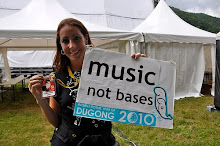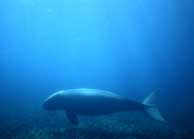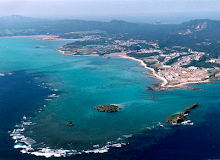 (photo by Rob Pott in Takae)
(photo by Rob Pott in Takae)US for OKINAWA is pleased to share Peace Boat`s statement for Biodiversity.
On October 18, 2010, the 10th meeting of the Conference of the Parties to the Convention on Biological Diversity (COP10) began in Nagoya, Japan. During our global voyages Peace Boat visits numerous places throughout the world including the Galapagos Islands, the Guiana Highlands, Rapa Nui (Easter Island), and Antarctica, learning about and spreading the importance of biodiversity. Throughout this process, we have learned that biodiversity is not only an issue of nature, environment, animals and plants, but also of peace and human rights. We also emphasize that this issue is deeply related to worldwide poverty, the rights of indigenous peoples, and conflict. Noting that war is the greatest destruction to the environment, we insist that global military expenditure – which exceeds 1.5 trillion US dollars a year – be allocated instead to protecting biodiversity.
To Peace Boat, a world where biodiversity is protected is one where all living creatures can be free of the threat of extinction or the threat of being killed unreasonably, and can fulfil each one of their lives. Such a world cannot be achieved without joint and continuous efforts by governments and civil societies across the globe.
Peace Boat calls for the points below regarding biodiversity:
To Peace Boat, a world where biodiversity is protected is one where all living creatures can be free of the threat of extinction or the threat of being killed unreasonably, and can fulfil each one of their lives. Such a world cannot be achieved without joint and continuous efforts by governments and civil societies across the globe.
Peace Boat calls for the points below regarding biodiversity:
- No need for military bases that threaten all natural lives
Military bases bring huge damage to the ecosystem. People living in Subic Bay in the Philippines still suffer from health and environmental problems even now, although the US military base was closed in 1991. In Ecuador, South America, US military bases were recently forced to withdraw, and Ecuador adopted a Constitution which prohibits any foreign bases or troops being stationed in their country. We need all countries to follow the lead of Ecuador in order to protect diverse lives.
The sea of Henoko, Okinawa, is a rich treasure of biodiversity where creatures such as the endangered dugong and precious corals live. We oppose the construction of a new military air base in Henoko's Oura Bay, and call for an Okinawa free of military bases. - Nuclear development and natural life cannot coexist
Peace Boat has travelled around the world with more than 100 Hibakusha (atomic bomb survivors) from Hiroshima and Nagasaki to talk about the devastation caused by nuclear weapons. Through our voyages we have learned that there are people who suffer over generations because of radiation from nuclear facilities and depleted uranium weapons. We have also learned that the common wish of ordinary citizens across the world is to live in a nuclear-free world. Nuclear waste is also a great concern. Nuclear weapons and development pose a threat to all living creatures on earth and to the environment. Citizens and governments must work together in order to realize a 'nuclear-free world'. - Realize a world where the rights of indigenous peoples are ensured
While indigenous people across the world have lived over generations in harmony with nature, they also have long suffered from violation of their rights. In British Columbia, Canada, a mass tourist resort development is violating the sacred land of the indigenous people, making it difficult for them to carry on their lives in the forest where they have always lived. There should be no human rights violations in the name of 'environmental protection' or 'development'. It is important that we learn to live in harmony with nature following the wisdom of indigenous peoples, and build a society where their lifestyles, cultures and rights are protected and respected. As an NGO based in Japan, we particularly pledge to learn from the Ainu, the indigenous people of Japan, and to deepen our activities in this field. - Re-examine 'development'
Through our global voyages, we have learned that our lives depend deeply upon the rich biodiversity existing throughout the world. Simultaneously, we have seen that mass development and deforestation have exacerbated environment degradation and poverty, and also the many people striving to improve such situations. It is time to re-examine the path of 'development' and 'modernization' we have taken, and to search for a sustainable solution for building the society. In order to realize this, all states must work together in cooperation for the global interest rather than confront each other in pursuit of short-term national interest.




No comments:
Post a Comment